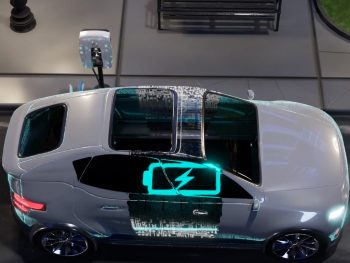EV batteries will become valuable mobile asset away from home under V2X, says Indra
Future developments in V2X charging could mean that drivers will be able to use the energy in their batteries as a valuable asset away from home to gain added benefits.

Under Indra’s 2033 Vision, EV drivers will be able to harness, store and use or trade greener, cheaper energy while away from home
A new short film from British charging tech firm Indra sets out that such technology will transform people’s EVs into mobile batteries on wheels, enabling owners to harness, store and use or trade greener, cheaper energy.
V2X, which stands for ‘Vehicle-to-Everything’, is bidirectional charging technology that allows energy to be passed to or from an electric vehicle battery. In other words, as well as being able to charge your car or van as normal, you can also discharge energy stored in your car’s battery to power electricity in your home, office buildings, or the national grid.
But under the company’s 2033 Vision, not only could EV batteries help power a home or trade surplus power back to the grid, but they could also become a valuable mobile asset to use when away from home.
According to Indra, drivers will be able to trade energy with airports, workplaces or even hospitals while parked, gaining rewards, travel discounts, extra income or free parking.
“Bidirectional charging will fundamentally change the way we view and interact with energy and our cars and vans. EVs will effectively become mobile batteries on wheels for harnessing, storing and then using greener, cheaper energy to power our homes or sell back to the grid,” said Indra founder and chief product officer Mike Schooling.
“In the future, we will no longer be tied to a traditional energy infrastructure, but will be able to access, trade and share energy. This means that EVs and bidirectional charging could play a hugely significant role in creating a flexible, sustainable energy eco-system and enabling the Government to achieve its net zero ambitions.”
Nearly half of UK drivers would buy an EV if they could also use it to power their home
Indra has also published new research showing that almost half (49%) of drivers said bidirectional charging would tempt them to buy an EV, amid the energy crisis. A total of 61% of drivers admitted they feel they have no control over their home energy bills and 65% believe that turning off appliances is the only way to reduce them.
But the company’s ‘Indra-dex’ research also showed that inflated perceptions of electric vehicle charging and running costs are putting the brakes on greater EV uptake, meaning thousands of drivers are missing out on financial and CO2 savings.
Its analysis found many drivers believe petrol cars will be the most cost-effective mode of transport over the next 6-12 months (37%), followed by public transport (18%) and diesel engine vehicles (18%). EVs came fourth place, with only 16% of those polled believing them to be the cheapest way to travel, despite their low running costs.
The research also found that some 59% over-estimated the cost for charging an EV, with some believing it could amount to £150-£200 for a single charge. These perceptions are contrary to real-world findings, where EV running costs are generally much lower than those of petrol and diesel cars, especially when charged at home.
Analysis by Indra shows the average cost of fuelling a 1.5-litre petrol car is £74 for a full tank, equating to approximately 16p per mile. This compares to the average costs to charge a family-sized EV with a 64kWh battery from empty, estimated to be around £21 when using a standard charger on a standard variable energy tariff.
And the arrival of EV-specific tariffs, such as Ovo’s Charge Anytime tariff at 10p per kWh when using a smart home charger such as the Indra Smart PRO, this could drop to below £7 for a full charge, equating to 2p a mile.
This means that drivers of petrol vehicles are paying up to eight times more per mile to run their vehicle compared to an EV equivalent.
Indra’s Mike Schooling said the cost savings from running an EV will improve further as we move towards widespread adoption of bidirectional or V2X charging.
“Bidirectional charging technology takes savings on transport costs to whole new level, enabling EV drivers to not only capitalise on cheaper energy tariffs and lower-carbon energy, but also discharge surplus energy from their vehicles to either power their homes or even trade it back to the grid at peak energy times, when prices are typically at their highest.”
Trials of Indra’s bidirectional charging tech have repeatedly shown savings of around £100-200 on participants’ monthly energy bills – and the firm’s poll of drivers found almost half (49%) said bidirectional charging would tempt them to buy an EV.
While such technology is not yet available outside of trials, work by Indra and other leading businesses – supported by government-backed funding from the V2X Innovation Programme – will enable large-scale adoption of this technology.
Harry Wallop, consumer journalist and Times columnist, said: “Bidirectional charging is such an exciting technology. The idea that an electric vehicle could not only be a car but also a portable battery – providing a sustainable source of power to people’s homes – could transform not just the EV market, but also how we think about electricity. At a time of rising energy costs, increasing global demand on energy resources and climate change, this could be a very clever solution, potentially saving consumers money and allowing us to harness far more green energy than we currently do.”

